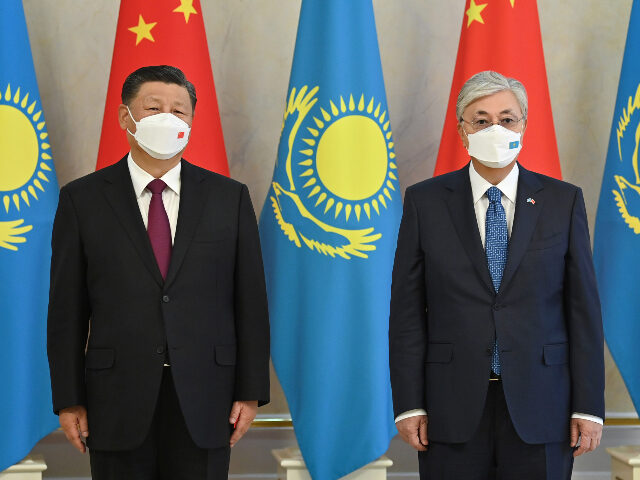Protesters who say they have lost loved ones to China’s genocide of Turkic people in occupied East Turkistan told Radio Free Europe/Radio Liberty (RFE/RL) on Wednesday that the government of Kazakhstan threatened and, in some cases, arrested them in anticipation of Xi Jinping’s visit to the country this week.
Xi landed in Nur-Sultan, the capital of Kazakhstan, on Tuesday, spending less than a day in the country to meet with President Kassym-Jomart Tokayev and later travel with him to neighboring Uzbekistan for the Shanghai Cooperation Organization (SCO) summit there. The trip is Xi’s first out of the country since the Chinese coronavirus pandemic began in Wuhan, China, in late 2019.
Tokayev greeted Xi warmly, with military fanfare at the airport and later a ceremony to award him the nation’s highest honor available to foreigners, the “Order of ‘Altyn Kyran,’” for his alleged efforts to develop friendly ties between Beijing and Nur-Sultan.
Xi is currently presiding over a genocide of the indigenous population of East Turkistan, a region China administers under the name “Xinjiang Uyghur Autonomous Region.” While the vast majority of those that the Communist Party has enslaved, imprisoned, sterilized, and shipped to concentration camps have been ethnic Uyghurs, East Turkistan is home to about 1.6 million ethnic Kazakhs, many with family ties that cross the border into Kazakhstan.
Rather than condemn the heavily documented genocide, the government of Kazakhstan has remained silent in the face of mounting evidence that Kazakhs are disappearing into camps and facing sterilization and other abuses. Kazakh officials have increased economic and political ties to Beijing and allowed only periodic, small protests by the loved ones of those affected by the genocide. Some of the most prominent members of this community denounced to RFE/RL that the little freedom they were allowed to be quietly present near the Chinese embassy on some occasions evaporated entirely prior to Xi’s visit.
“Protesters say they have been met with a wave of arrests, police summonses, and warnings not to travel to Nur-Sultan in an attempt to prevent dissent during the Chinese leader’s state visit,” the U.S.-based outlet reported.
Some of those who spoke to RFE/RL said that their relatives were arrested while planning to protest the genocide. Bakhyt Zharykbasova, one of those impacted, said her husband Baibolat Kunbolat was arrested for attempting to organize a protest outside of China’s consulate in the country’s largest city, Almaty. Kunbolat’s brother Baimurat Nauryzbek was arrested in China and sentenced to ten years in prison for alleged “racial hatred” postings online; the family is originally from East Turkistan.
“The authorities warned him and I warned him, [too], but he decided that this is what he is going to do and [that] he will keep doing it,” Zharykbasova told RFE/RL. “Baibolat says he is fine [in detention], but I know they will not let him out as long as the Chinese president is here.”
Others told the American media organization that they were arrested and barred from entering the capital simply because they had participated in protests in the past, but did not have any plans to protest Xi’s arrival.
“The police demanded that we get off the bus and then they took us to the police station,” Gulfiya Kazybek, a participant in prior protests, told RFE/RL, noting that she and two other women, Gaukhar Kurmanaliyeva and Qalida Akytkhan, were traveling to a wedding, not taking a bus to any protest activity. Police issued them summonses, anyway.
Kurmanaliyeva noted that police attempted to discourage them from protesting, which they did not intend to do, by claiming that the Kazakh government and Tokayev specifically would discuss the Chinese genocide with Xi during his visit.
If the conversation occurred, neither the Kazakh nor Chinese government have made it public. On the contrary, Tokayev embraced Xi and regaled him with the nation’s honors.
Tokayev’s office published a readout of the visit that did not mention the Uyghur the genocide or the human rights atrocities committed against Kazakhs by Xi’s regime. Instead, according to the document, “the parties discussed the prospects for enhancing cooperation in the transport, logistics and agro-industrial areas, as well as touched upon the issues of use of transboundary water resources.”
Kazakhstan relies heavily on Chinese commerce and is the first nation to have signed onto China’s Belt and Road Initiative (BRI). Xi announced the BRI, which at the time he called a “new silk road,” in the country in 2013, claiming it necessary to rebuild infrastructure across Europe and Asia to reconnect China to western Europe, as in the days of the Ancient Silk Road. Kazakhstan, in the heart of central Asia, would play a key role in the project, Xi said at the time.
Since its announcement, the BRI has expanded far beyond the traditional trade routes it is named after to unrelated allied nations such as Cuba and Kenya. China has used BRI loans – meant to pay China to buy railways, ports, and other commercial infrastructure – to heavily indebt countries and erode their sovereignty, with most devastating effect so far in Sri Lanka.
In an article on his visit published this week, Xi reiterated his desire to bring Kazakhstan further into China’s orbit through the BRI.
“Setting our sight beyond the pandemic, China would like to partner with Kazakhstan to remain pioneers in Belt and Road cooperation,” Xi wrote. “We should improve investment and trade facilitation, fully unleash the potential of border ports and cross-border transportation, and cultivate new sources of growth such as artificial intelligence, big data, digital finance, e-commerce and green energy.”

COMMENTS
Please let us know if you're having issues with commenting.